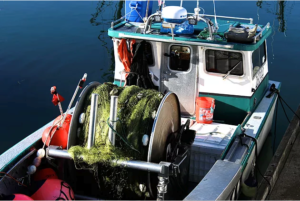FISHERIES AFTER BREXIT [HOUSE OF LORDS REPORT]
April 7, 2017

Whatever the eventual outcome of negotiations, one topic is likely to dominate discussion in the UK fishery sector for months and years to come: Brexit. With potential to lead to significant changes for fishery management, and fishermen’s lives, we will be following developments as the UK’s departure from the European Union takes shape. With so much information flying around, Mindfully Wired is looking to cut through the complexity (where possible!), digest the key news around our new fishing future, and deliver updates. With this in mind, we have trawled through the Brexit: fisheries report of the House of Lords EU Committee, published on 17 December 2016 and pulled out key information. The report aimed to highlight the major opportunities and risks that arise from disentangling UK fisheries from the EU as well as the options available to the Government in the Brexit negotiations. The below digest contains 12 crucial points, with emphasis on aspects related to environmental and economic sustainability.
KEY ISSUES OUTLINED IN THE REPORT:
1. Coastal communities: post-Brexit, UK has an opportunity to recognise the interests of the coastal communities, maximising the potential economic, environmental and social benefits of fishing and including localised interests within the fisheries management regime. It is up to the government to decide whether to replace EU structural funding to the industry and coastal communities following Brexit.
2. Co-operation: As a result of the mobility of fish stocks, and international law obligations, UK will be required to co-operate with the adjacent states to manage stocks that are shared with neighbours. A degree of regional co-operation will be essential for an effective fisheries management within the UK, and necessary to maintain sustainability of shared stocks.
3. Total Allowable Catches: The Government declared it will continue to follow scientific advice in setting TACs. The report urges the Government to resist the temptation to set TACs above scientific recommendations to secure political gains. The extent to which Brexit will lead to higher quotas for UK fishers of stocks that are shared with other countries will be a matter for negotiations with the EU and neighbouring states.
4. UK EEZ: UK could declare an Exclusive Economic Zone (EEZ) independent from EU waters of nearly 300,000 square miles and control access that foreign vessels have to fishing in UK waters.
5. Access: Catch statistics suggest that EU vessels have a clear interest in preserving access to the UK EEZ and suggest that EU vessels fishing in the UK derive more benefits than UK vessels fishing in the EU. However, unilateral restriction on access to fishing in the UK EEZ would almost certainly lead to reciprocal restrictions being placed on UK vessels fishing in the EU EEZ. This would affect the UK fleet that relies on fishing outside the UK EEZ.
6. Quota-hopping: The practice of quota-hopping is linked to EU rules allowing setting up UK companies by non-UK nationals, rather than a consequence of the CFP – the legal status of quotas held by non-UK nationals after Brexit is complicated and unclear.
7. Trade: UK imports more fish than it exports. Trade in fish and seafood is essential to the wider seafood industry, which relies on importing raw goods at reduced or zero tariffs for domestic consumption, and on exporting domestic catches and production. Any disruptions to the current trading patterns could affect both the catching and processing sectors. The report urges for the fish sector to be included in the Government’s consideration of priorities for a future trading relationship with the EU. Negotiating trade relations with non-EU countries is likely to be complicated and time consuming, and may not compensate for current exports to the EU.
8. Fisheries in the wider Brexit negotiations: The fishing industry contributes a small proportion of the UK GDP compared to other sections of the UK economy, but has significant social, cultural and economic value for coastal communities across the country. The report asserts that it must not be marginalised in the wider Brexit negotiations.
KEY FINDINGS REGARDING SUSTAINABILITY:
9. International law: As an independent coastal state under the UN Convention on the Law of the Sea, the United Kingdom will be required to manage the living resources and fishing activities within its Exclusive Economic Zone in a sustainable way.
10. Participatory governance: Developing an effective and sustainable policy that is appropriate for UK waters and that respects the devolution settlement will require a process based on consultation and evidence. Implementing and enforcing such a policy will require substantial resources and political will
11. Science-based decision-making: Scientific advice is crucial to reaching agreement on the exploitation rates for shared stocks. Ministers should be under an obligation to set and negotiate TACs that are aligned with the scientific advice, and that will deliver the Maximum Sustainable Yield.
12. Shared stocks require shared management: Many stocks spend part of their lives in the waters of other countries and cannot be regarded as only ‘UK fish’. Shared management is essential to ensure long-term, sustainable exploitation of shared stocks and avoid over-fishing. Walking away from negotiations with other coastal states would, by leading to unilateral management of shared stocks, risk undermining the sustainability of fish stocks – it should be a last resort.
